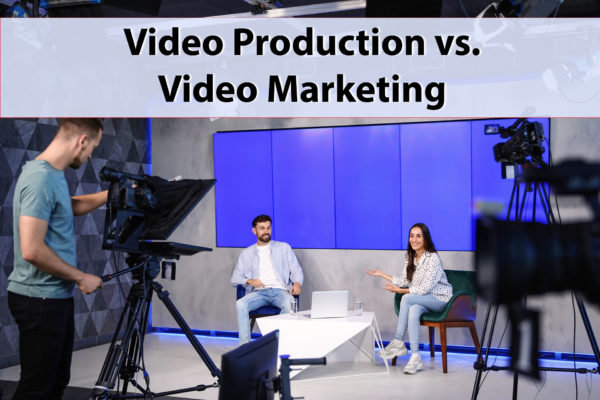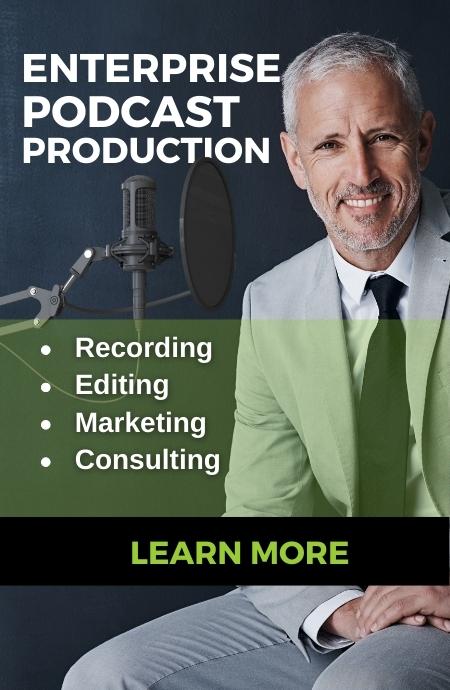In the world of digital marketing, two complementary aspects demand equal attention – video production and video marketing. These distinct but closely intertwined concepts are the backbone of successful digital campaigns. However, it’s essential to distinguish between the two to maximize their potential.
Video production and knowing what to do with marketing videos produced are two vastly different skills. One is a creative and technical function, while the latter is a marketing strategy exercise. Before we dive into these differences, first let’s discuss why video is so important today.
Video production and video marketing are mutually dependent. Simply put, without the creation of engaging video content (video production), there’s nothing to promote (video marketing). Similarly, producing quality videos without a well-devised marketing strategy won’t yield optimal results. By understanding the distinction and connection between these two elements, businesses can invest wisely and achieve their digital marketing goals more effectively.
Video is becoming increasingly popular with online audiences. Here are some other compelling facts about the increasing popularity of video across all channels:
- Video continues to be used by an overwhelming majority of businesses. 91% of businesses use video as a marketing tool in 2023 (Wyzowl)
- Videos are shared on social media 1200% more than both images and text posts combined (Social Media Today)
- 96% of video marketers say video marketing has increased user understanding of their product or service. (Wyzowl)
- 58% of customers trust a brand with videos more than a brand without videos (Animoto)
- Including a video in your newsletter increases the click-through rate by 63% (Social Media Today)
- 78% of viewers watch online videos every week, and 55% view them every day. (HubSpot)
- 64% of consumers are more likely to buy a product after watching a video (Social Media Today)
- Viewers memorize 95% of a message when they see it in a video, compared to 10% when reading it. (Insivia)
Understanding Video Marketing
At its core, video marketing is a strategic marketing approach centered on creating, distributing, and utilizing video content to attract and retain a clearly defined audience. Ultimately, the goal is to prompt profitable customer action. Video marketing involves applying marketing skills to video content, maximizing its reach, lifespan, and effectiveness.
In simpler terms, video marketing is all about using video content as a tool to increase brand visibility, extend reach, and engage audiences. It plays the role of getting your carefully crafted video (the product of video production) seen and appreciated by as many relevant viewers as possible.
Video Content Types
Content, especially video content, is the cornerstone of every digital marketing strategy. Businesses commonly leverage five types of video content to drive growth:
1. Long-form video content (e.g., webinars, tutorials)
2. Short video clips for social media
3. Downloadable video content (e.g., exclusive interviews, behind-the-scenes footage)
4. Native social media video content
5. Podcasts and audio-visual content
The Video Marketing Strategy
Creating video content and hoping it lands in front of your target audience isn’t enough. Success demands a well-rounded video marketing strategy.
Identifying the purpose of your video content is the first step. Video content can entertain, inform, educate, or a combination of these. The key is ensuring that it resonates with your audience and aligns with your chosen distribution channels.
You’ll also need to understand which types of video content will best drive business results. Are you aiming for lead generation, website traffic, brand recognition, or something else? Each goal demands a unique approach to video content creation and marketing.
Know Your Audience
Understanding your target audience is paramount. Tailor your video content to resonate with your audience’s preferences, lifestyle, and interests. Consider:
* How do they consume video content?
* Where do they watch videos? (e.g., desktop, mobile, at home, on the go)
* What video topics will most engage them, even if it doesn’t directly reference your product or service?
Deliver Value Through Video Content
Your video content must provide value to make a significant impact. This involves identifying your audience’s pain points, desires, and needs, then creating content that addresses these areas. Tutorial videos, for example, can offer viewers valuable skills or insights into your products and services.
When viewers watch your video, they’re investing their time and attention. Therefore, the value you provide must outweigh the time they spend consuming your content.
Produce Video In-House or Hire a Video Production Company?
Companies can opt for in-house production or outsource to professional video production agencies, depending on their resources and capabilities.
Video production and video marketing can come together as a package with the right agency, however, depending on your needs and your in-house resources you may only need one part or the other.
Many video producers set themselves up for failure when they accept a video project that has no marketing strategy behind it. Sure, they can create a product and hand it over to the marketer who hired them, but will that marketer or company be happy in the end when they cannot surface any ROI on the video?
You always want heavy marketing involvement during the pre-planning of video production. They can show the production team the various messages and targets to aim for in the final produced video project.
It is best to also look at a video from a holistic view, just like you would with your general content strategy. Focus on your viewers’ pain points and how your product can solve them. It would help if you tried to educate and inform, which will provide value to your audience.
With all of this taken into consideration, you have a win-win if the production company also has marketers on staff that speak the language of marketing strategy. They will also understand how to maximize the use of the video from a marketing standpoint once the video is launched.
Here are the differences between Video Production and Video Marketing to consider:
What is Video Production?
Let’s start by defining video production services. Businesses that want to produce video will usually look for a video production company. A video production company has the necessary skills, crew, and equipment. Video production involves creating video content from scratch or reimagining existing content, so having a company with an understanding of marketing is a major plus for business video content production.
A well-experienced production company can assist in casting, technical solutions, scheduling, and budgeting. The video production company makes a video according to the client’s desires, edits it, and delivers it to the client.
Did you know that you can produce professional video with a REMOTE Producer?
Learn more here
Although the production company has specialized knowledge to create videos, it may lack the serious marketing expertise and strategic planning that is necessary to build a brand. Typically, this is to be expected as they do what they are best at: producing video.
Once the business receives the final video, unless they have in-house video marketing experience, they would then be required to hire a marketing agency to ensure the content gets in front of their target audience. Again, this is only if the video production company does not also have video marketing experience to extend toward creating an effective strategy.
Unless you have a professional digital marketer on your team that can create a great strategy and knows what to do with the final product, you can’t expect a production company to make a video that will help your marketing strategy. Clients that choose to work specifically with a video production company that lacks video marketing strategy services will eventually find out that they need a marketing agency to fix the video so that it is marketable.
The result of this mistake could be additional time and more money trying to recover an investment that wasn’t done correctly or with a strategic plan in mind. Before any video production begins, several meetings to discuss the marketing strategy and goals should occur. The marketing team and the production team should be in full alignment.
Once video production begins, it consists of three phases:
Pre Production
In this step, the production company will start making plans about putting together a video. The first step is to write a script where someone on the team puts down what exactly will happen in the video. These might be segments where a specific topic will be discussed or where actors in the video will do a product demonstration.
Included in this step are storyboarding, writing dialogues, and what will happen in specific scenes. During this phase, the most common steps are making a schedule, scouting locations, creating graphic solutions, and preparing a wardrobe.
Production
The production stage is when the video is made. During the production stage, a camera crew will begin to shoot the video scenes. In the production phase, the crew focuses on angles, lighting, and location to make the video look as appealing as possible. In some cases, a team of graphic artists will make graphics to display the environment of a video.
Post Production
During this phase, a studio will review the video and audio footage made. They have to make sure that the whole video has been produced as planned. The team will then put together the visual and sound effects, and audio enhancements to finish the final product.
After that, the crew will use video editing software. With this software, the team can successfully complete the project and prepare it for distribution.
Video Marketing
Unlike a video production company, a video marketing agency defines business and marketing goals to formulate a marketing-and-video strategy. It determines the company’s specific marketing needs and provides solutions in the form of a video.
Instead of the client working alone to determine the most effective video asset, video marketing services are capable of helping their client identify which types of videos will be most effective.
The goal is for the video marketer to target the client’s ideal customer by creating engaging video content and promoting it at the right time, on the right platform, and to the right customers. This is what’s known as video optimization.
Video marketing services include:
- Understanding the client’s marketing problem
- Finding a solution and identifying the right type of video
- Identifying the target audience
- Recommending a customized video strategy
- Creating a video in alignment with the brand values
- Creating a video with the goal to attract the target audience
- Determining where and how the video will be promoted
- Shooting the video (if the company does both production and strategy)
- Measuring the results of the video
- Incorporating other digital marketing elements into the campaign when necessary.
Video requirements, strategizing, optimization, and creativity are essential for a video marketing company to be considered successful. Companies with experience in video marketing can help clients realize all this before production actually starts and before there’s a risk of losing a significant amount of money.
Production and Marketing of Video: Two Sides of the Same Coin
Video marketing and video production are independent disciplines requiring distinct skills. Video producers may not necessarily know how to market their content, and marketers may lack the skills to produce it. However, together, they form a feedback loop. You create video content, market it, gain insights about your audience, and start the cycle again with improved data and more impactful video content.
If you are seriously considering implementing more video to increase engagement with your target audience, it is highly recommended that you seek out an expert at video marketing to develop a comprehensive marketing strategy, create content that converts, ensure your videos are actually being seen, and ultimately protect your initial investment.
Do you need help creating AND promoting the right videos? Then talk to a professional at Content Monsta!
- The Importance of Video Content in AI-Driven SearchAI-driven generative search engines reshape how information is discovered and consumed, video content is gaining an edge in visibility, engagement, and credibility.
- The Advantage of Executive Led Video ContentUnlock the full potential of your brand with executive-led video content, a powerful tool proven to build credibility and drive engagement. Discover how thought leadership videos not only boost visibility but also influence buyer behavior, securing a competitive edge in the B2B sector.
- How to Create Compelling Video and Audio Content: 12 Best Practices and Tips for SuccessCreating engaging video and audio content is crucial for marketers. Learn essential strategies to elevate your content game. Whether you’re a seasoned creator or just starting out, these tips will help you connect with your audience more effectively. Discover how to make your content truly resonate.







